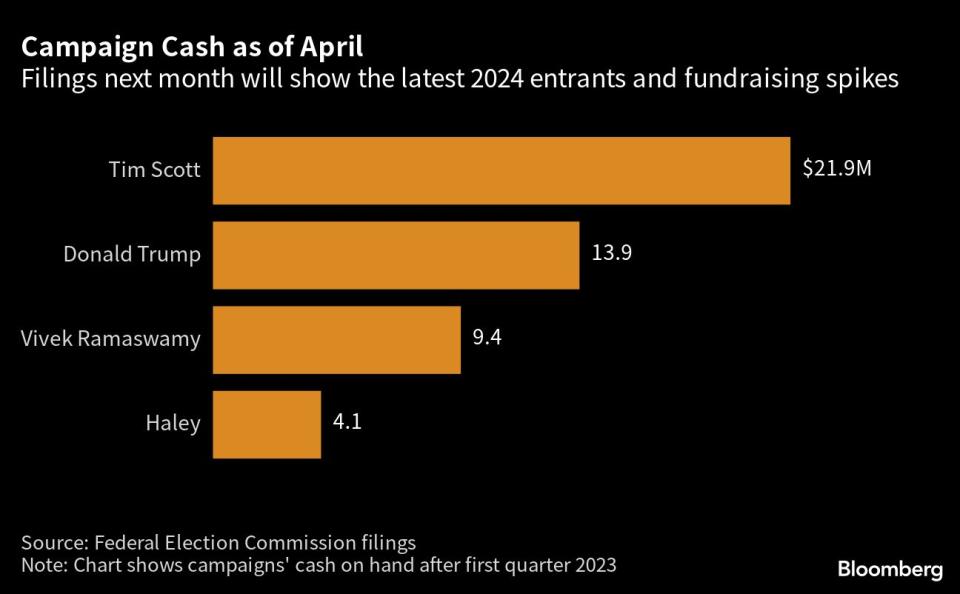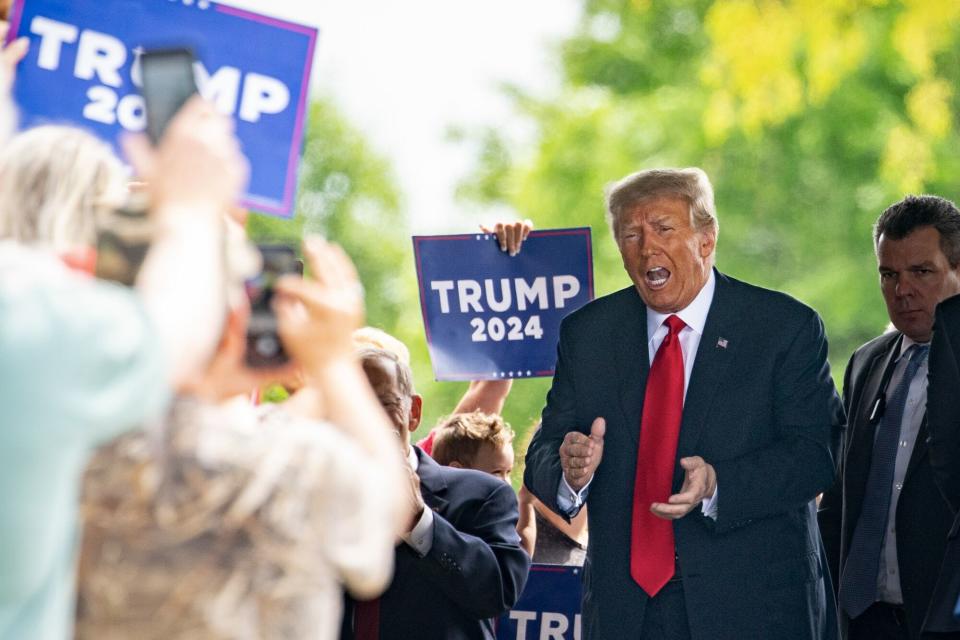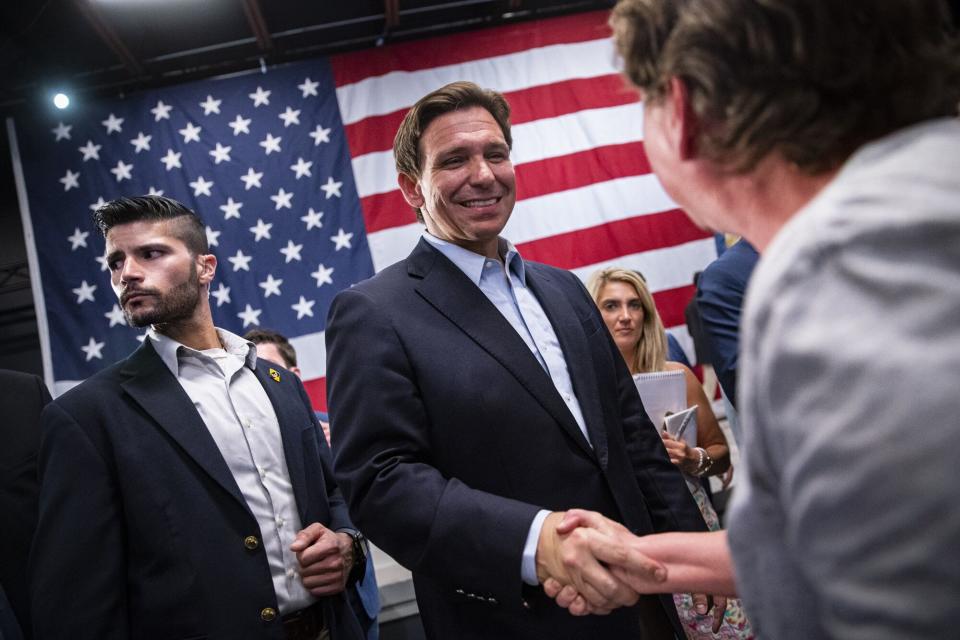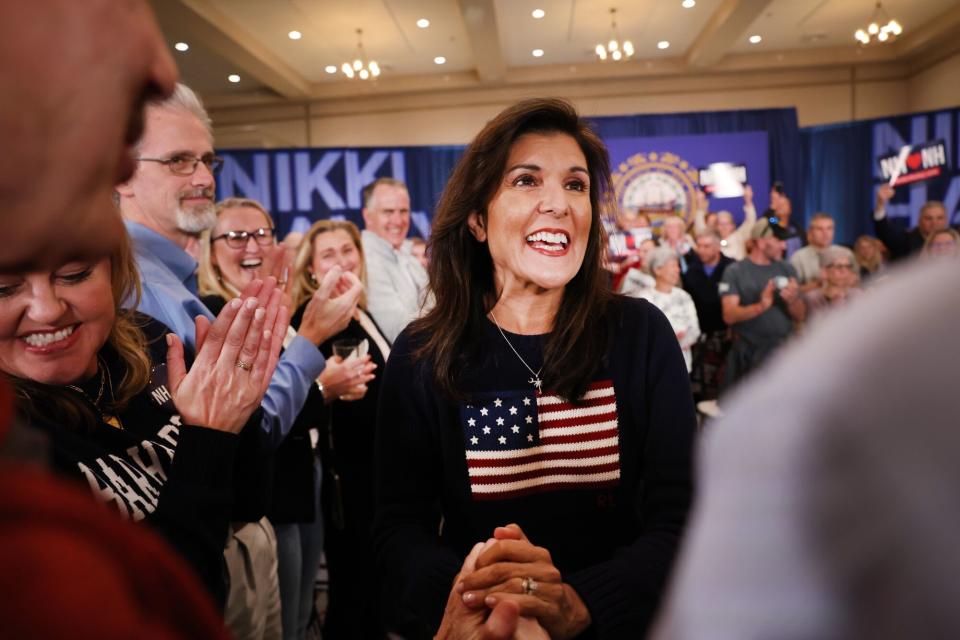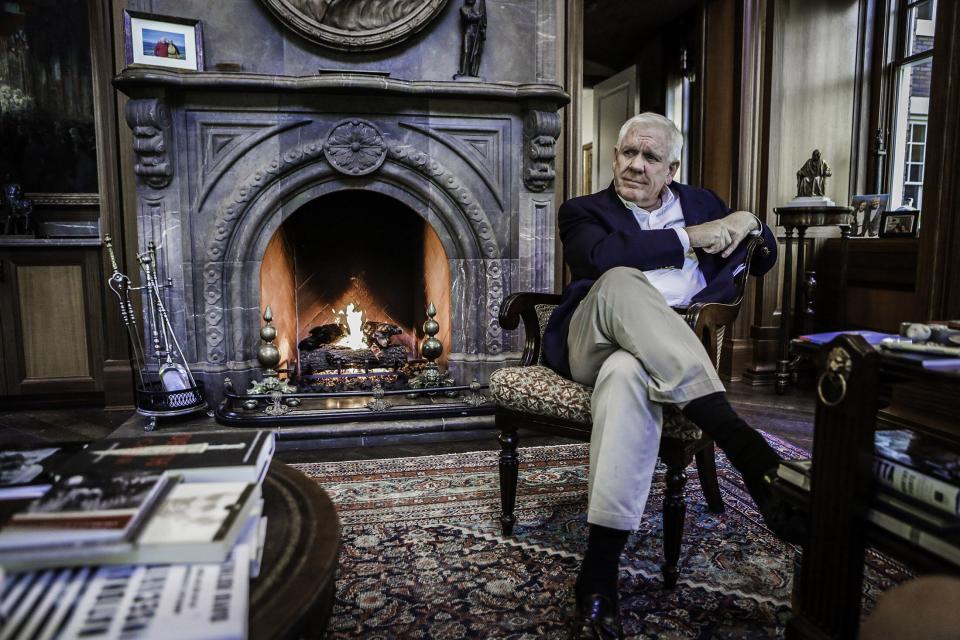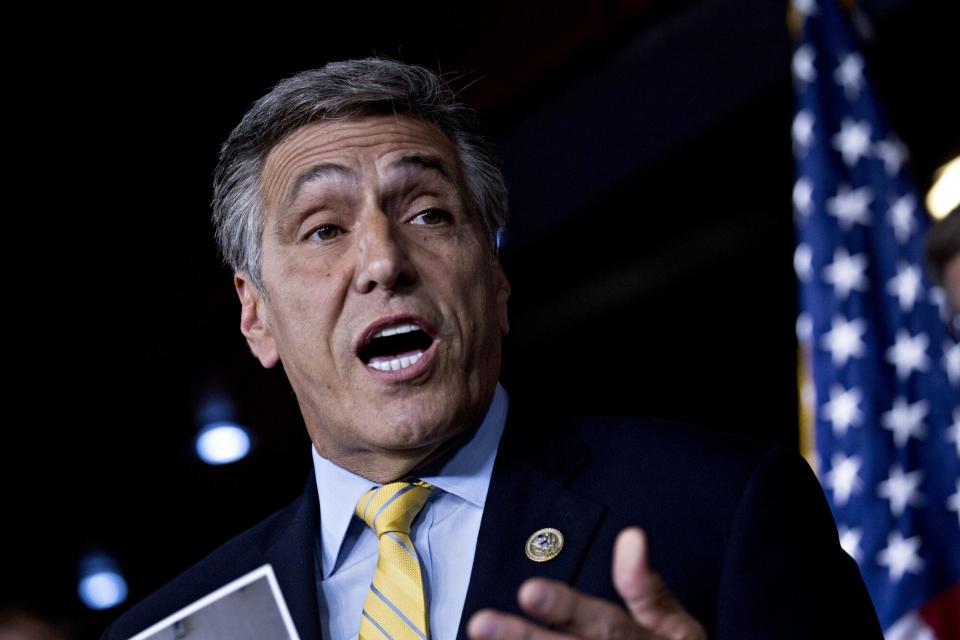Trump’s 2024 Rivals Woo Billionaires to Counter His Loyal Donors
- Oops!Something went wrong.Please try again later.
- Oops!Something went wrong.Please try again later.
- Oops!Something went wrong.Please try again later.
(Bloomberg) -- Republican presidential candidates face a crucial, early test next month of whether they can raise enough money to sustain their campaigns through party primaries and break away from a growing GOP field.
Most Read from Bloomberg
Frontrunner Donald Trump is sticking with his battle-tested strategy of relying on a wide network of small-dollar donors to fund his bid. His top rival, Florida Governor Ron DeSantis, and other challengers are hurriedly crisscrossing the country this month to woo wealthy donors to bankroll their campaigns ahead of a July 15 report detailing how much money they raised during the second quarter.
That disclosure, the first look at how the presidential hopefuls fared during the early days on the stump, will signal to voters whether their bids have potential. That could convince other donors to open up their wallets and will help determine if the contenders make it onto the first debate stage in August.
“One of the first ways to think about how competitive candidates are is how much money they’re raising,” said Candice J. Nelson, a professor who directs American University’s Campaign Management Institute. “We’ve suddenly got a bunch of Republicans jumping in, and they’ve got to find some way to prove that they are viable against Trump.”
From events such as a Dallas fundraiser hosted by billionaires to a dinner at a four-star Washington hotel, Trump’s numerous challengers are trying to wrangle support from donors who can cut big checks. It isn’t clear yet if any of them have the grassroots support to generate $20 donations from average voters at the same scale as the former president, and these potentially divergent strategies could lead to a Republican race pitting cash from the 1% versus everyone else.
On Thursday, Trump’s campaign immediately sought to raise money from small donors after he said that his attorneys told him that he was indicted for his handling of classified materials after he left the White House.
Read more: Burgum Latest to Join 2024 Race: Here Are the Other Contenders
DeSantis, for instance, launched his campaign last month at the Four Seasons in Miami. There, his rich and influential supporters — including energy executive Dan Eberhart and former Pennsylvania Representative Lou Barletta —- called their friends and colleagues to drum up support and dollars for the governor. The DeSantis team gave the donors large nametags calling them investors, leaning into their financial importance.
The campaign touted that it raised more than $8 million within the first 24 hours of officially launching. But about two-thirds of the people contacted by a donor during the phone call blitz weren’t inclined to back the 44-year-old governor and still supported Trump, the person said. Several people specifically cited DeSantis’s push for a six-week abortion ban in Florida as a key hang-up, another donor said.
DeSantis, who trails Trump by roughly 30 percentage points in FiveThirtyEight’s average of primary presidential polls, is pressing on. He attended six fundraisers in early June in Texas, including a Houston event co-hosted by conservative Texas mega-donor Richard Weekley. On June 19, he will raise funds over a breakfast in Sacramento, California.
Since super PACs and political advocacy groups can accept effectively limitless amounts of cash, unlike campaigns that are restricted to $3,300 per donor, wooing wealthy contributors to pay for attack ads is key. There, Trump has struggled, as major donors who have supported him before, including New York billionaire John Catsimatidis and Miriam Adelson, the widow of casino magnate Sheldon Adelson, have said they’ll sit out the primary.
For candidates currently polling in the single digits — Mike Pence, Nikki Haley, Vivek Ramaswamy, Tim Scott, Chris Christie and Asa Hutchinson —- the July 15 deadline is crucial to show that they have the backing from big spenders influential in Republican politics. But they also need to have at least 40,000 unique donors across the country to make the first GOP debate in August.
Failing to show both strong fundraising totals and a large number of contributors would mean a death knell to any of the low-polling candidates. The Haley and Ramaswamy campaigns say they’ve already met the donor requirement.
Despite trailing in the polls, Haley has found supporters among some of the richest Americans. Billionaires Harlan Crow and Ross Perot Jr. were among those who hosted a fundraising dinner for her this month in Dallas. Next week, billionaire venture capitalist Tim Draper is throwing her a lunch in the San Francisco Bay Area.
Other wealthy hosts for Haley events include energy tycoons Harold Hamm and Ray Lee Hunt, Doug Deason, the son of billionaire Darwin Deason, and Robert Dedman Jr., whose father founded ClubCorp, the largest owner and operator of private golf and country clubs in the US.
Even President Joe Biden, who isn’t facing serious competition in his primary, is going on a fundraising blitz ahead of the same disclosure deadline. He’s attending events in Chicago hosted by Illinois governor and billionaire JB Pritzker, as well as stops in the San Francisco area, home to deep-pocketed Democratic donors such as climate activist Tom Steyer and entrepreneur Mark Pincus.
--With assistance from Christian Hall.
Most Read from Bloomberg Businessweek
Layoffs and AI Are Changing Tech’s Once-Invincible Job Market
Google CEO Vows Not to Rush AI and Says Efficiency Drive Continues
Illumina’s Sudden CEO Exit Is Just One of Many Problems Facing DNA Company
©2023 Bloomberg L.P.

